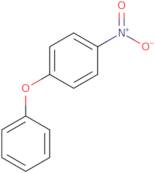4-Nitrophenyl phenyl ether
CAS: 620-88-2
Rif. 3D-FN53970
| 25g | Fuori produzione | ||
| 50g | Fuori produzione | ||
| 100g | Fuori produzione | ||
| 250g | Fuori produzione | ||
| 500g | Fuori produzione |
Informazioni sul prodotto
- 1-Nitro-4-phenoxybenzene4-Nitrodiphenyl ether
- 1-Nitro-4-Phenoxybenzene
- 1-Phenoxy-4-nitrobenzene
- 2-chloro-1-[2,5-dimethyl-1-(4-methylphenyl)-1H-pyrrol-3-yl]ethanone
- 2-chloro-N-(2-fluorophenyl)acetamide
- 4-Nitrodiphenyl ether
- 4-Phenoxy-1-nitrobenzene
- 4-Phenoxynitrobenzene
- Benzene, 1-nitro-4-phenoxy-
- Ether, p-nitrophenyl phenyl
- Vedi altri sinonimi
- Methyl 2-[(Chloroacetyl)Amino]Benzoate
- NSC 5420
- NSC 57080
- P-Nitrodiphenylether
- Rh 0211
- p-Nitrodiphenyl ether
- p-Nitrophenyl phenyl ether
4-Nitrophenyl phenyl ether is a chemical substance that has been shown to have anthelmintic activity. It is used in the treatment of nematode infections. 4-Nitrophenyl phenyl ether is not active against other parasites, such as cestodes or trematodes. 4-Nitrophenyl phenyl ether binds tightly to the enzyme dehydroascorbate reductase and inhibits its activity, leading to the accumulation of toxic hydrogen peroxide and depletion of reduced glutathione in cells. This inhibits mitochondrial respiration and leads to cell death by apoptosis. The expression plasmid containing the nitro group encoding gene is able to be transcribed into mRNA and translated into protein when it is introduced into a bacterial cell. Hydrochloric acid can be used for the hydrolysis of this compound, which will result in trifluoroacetic acid and nitrobenzene. Trifluoromethanesulfonic acid





